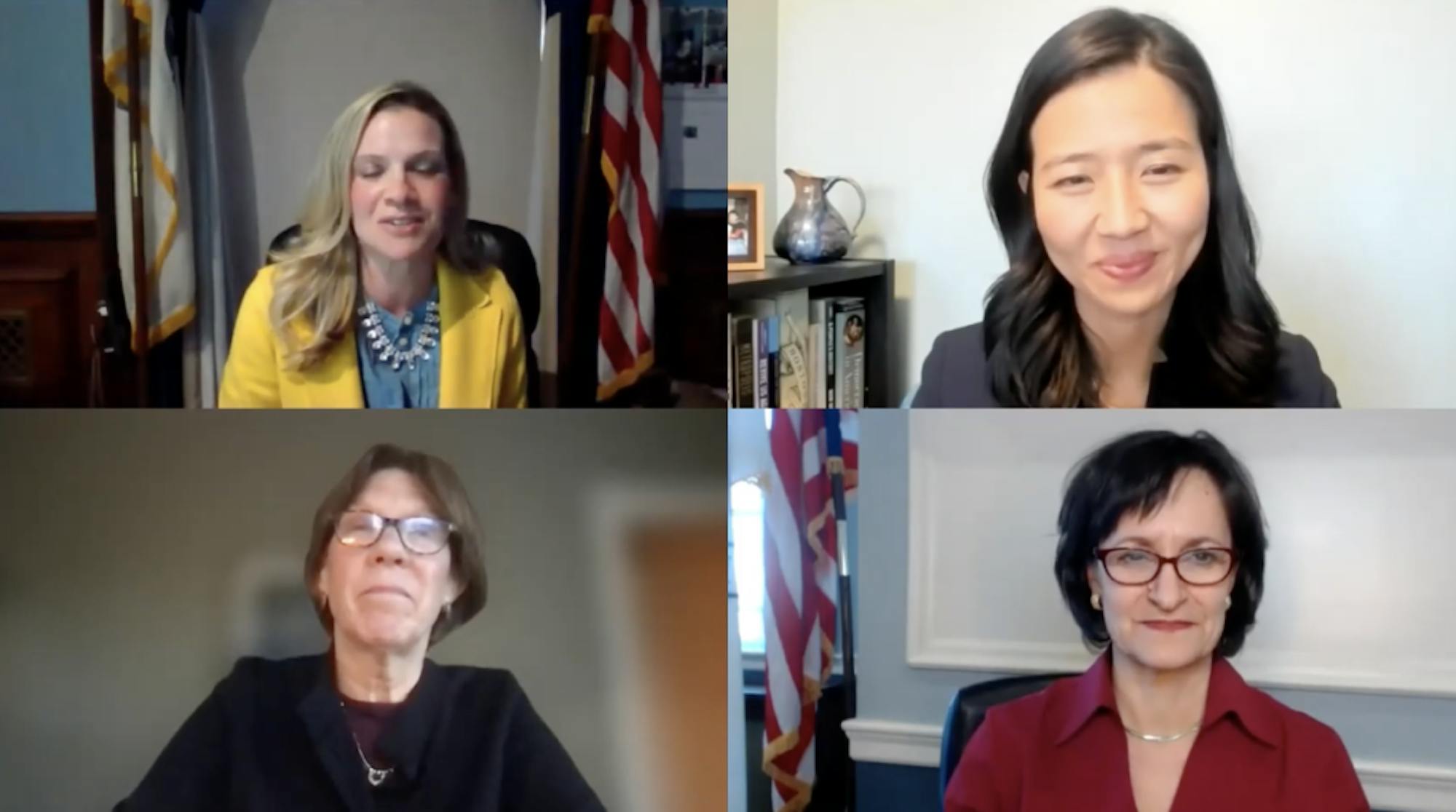Mayors Katjana Ballantyne of Somerville, Breanna Lungo-Koehn of Medford and Michelle Wu of Boston came together for a virtual discussion on March 22 in the latest installment of the Jonathan M. Tisch College of Civic Lifes Solomont Speaker Series. They discussed the challenges they face as women in politics as well as their plans to transform their communities.
Mary Jeka, senior vice president and general counsel at Tufts, and Rocco Dirico, executive director of government and community relations at Tufts, moderated the discussion.
In his opening remarks, University President Anthony Monaco spoke about the history that Ballantyne, Lungo-Koehn and Wu are making as female mayors.
“For the first time in history, all of Tufts University’s host cities … are led by women mayors,” Monaco said. “What better way to celebrate Women’s History Month than a conversation with three women making history?”
Jeka asked the panelists about the Equal Rights Amendment and why it was historically contentious.
In her response, Ballantyne mentioned the weight of gender and societal norms.
“Over time the traditions, rules and norms had different expectations for women,” Ballantyne said. “I can certainly say that the expectation coming from my family and even my parents — there were definite gender norms.”
Wu also spoke about gender norms and the value of changing public perceptions of what is possible.
“I truly believe that the biggest barrier in the Boston area … is our sometimes misinformed belief that we can’t do more,”Wu said. “We’re not only thinking about how we change things in this moment but how we are adjusting our frames of what we expect leadership to look like.”
The mayors were then asked about how they have worked to implement diversity-conscious policies.
Lungo-Koehn pointed to statistics to discuss the diversity of new hires for Medford city government.
“25% of our workforce has been from diverse populations, and we’ve had a number of people that speak a second language,” Lungo-Koehn said. “That is our goal: to make the city representative of the community we serve.”
Wu was asked about the challenges of balancing public and private life. Recently, protesters have set up outside her private residence to harass her in the early morning and throughout the day.
“As we continue to see the increased polarization and politicization of issues like public health and democracy and voting rights nationally, it does seep into the interactions we have locally as well,” Wu said. “I hope that, as Boston and our sister cities model what it means to not just deliver bold policy but create an inclusive empowering politics, we can have an impact in reshaping what the political dynamic is in a broader sense too.”
Jeka asked the mayors about their vision for the future of transportation in their cities.
“The primary focus … is [to] invest in people,” Ballantyne said. “[This] needs to be a people-centric world. [We must] make sure our most vulnerable communities have connection and access to transit … [and] restore Somerville back to a place where residents and their families can live with social, economic, environment and transit justice.”
Ballantyne also mentioned that there is much to still achieve when it comes to public transportation equity in the region.
“We should celebrate our shared achievements, absolutely, but we also need to keep working for transportation equity,” Ballantyne added.
The mayors also discussed the need for more affordable housing in their communities.
“We need a variety of different levels [of affordable development] to make sure everyone has the ability to afford housing,”Lungo-Koehn said. “People just need to be educated. … We do need development here, we need affordable housing, there’s a crisis in the commonwealth.”
Wu echoed Lungo-Koehn’s sentiments.
“We are looking at every possible angle where the city at the local level can make a difference in this issue while recognizing that this is very much impacted by state and federal investments and policies as well,” Wu said.
Ballantyne expressed support for new zoning laws and mandating that portions of new housing be designated as affordable to counteract the affordability crisis.
In response to an audience question on the use of research to inform public policy, the three mayors explained how academic research has influenced their decisions during the pandemic. Lungo-Koehn specifically acknowledged the value Tufts’ research had on guiding Medford’s COVID-19 response.
The mayors discussed the women in their lives that inspired them to go into politics.
“It’s my mom and the culture that she fed,”Ballantyne said. “I didn’t know it would lead to politics.”
Wu named Massachusetts Senator Elizabeth Warren as her inspiration.
“I would not be in politics without Senator Elizabeth Warren,”Wu said. “[She] really gave me the ability to see and think thatmaybe someone like me, who had never been exposed to politics growing up, might be able to stay the same, true, real person, as well, in this business.”






